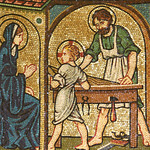
It looks to me very much as if the association of carpentry (or artisan of any kind) being associated with Jesus originated as a clever rhetorical device. Mark is regularly associated with “irony” and maybe that trait was also the origin of Jesus’ first job description.
The word Mark uses is tekton, and BibleStudyTools offers its meanings (bluntly and without discrimination as to the when’s and where’s of such meanings) here as:
a worker in wood, a carpenter, joiner, builder
a ship’s carpenter or builder
any craftsman, or workman
the art of poetry, maker of songs
a planner, contriver, plotter
an author
Mark wrote 6:1-6:
And he went out from thence, and came into his own country; and his disciples follow hm.
And when the sabbath day was come, he began to teach in the synagogue: and many hearing him were astonished, saying, From whence hath this man these things? and what wisdom is this which is given unto him, that even such mighty works are wrought by his hands?
Is not this the carpenter, the son of Mary, the brother of James, and Joses, and of Juda, and Simon? and are not his sisters here with us? And they were offended at him.
But Jesus, said unto them, A prophet is not without honour, but in his own country, and among his own kin, and in his own house.
And he could there do no mighty work, save that he laid his hands upon a few sick folk, and healed them.
And he marvelled because of their unbelief. And he went round about the villages, teaching.
The interlinear Greek and English for the critical verses 2-3 can be viewed here.
I can’t help being a little curious about a couple of details here, and one is the way the tekton word is introduced.
Jesus is called a ‘tekton/artisan’ in response to the rhetorical reference to “mighty works wrought by his hands“. (Mark 6:2-3).
Now “handiwork” is exactly what a tekton does.
Doesn’t this come across as another example of Mark’s portrayal of the spiritual blindness of the lesser mortals — similar to sceptics saying: Is this the shepherd/potter of Israel? And the narrator has them trip over themselves by replying: Nah, just a shepherd/potter.
Whether the tekton reference is historical or not, there certainly appears to be literary artifice in the way it is introduced. And perhaps not only literary artifice, but also theological intent. Does not Mark regularly depict spiritual blindness by mundane images taken at face value, and elsewhere lace his stories with details that are really spiritual symbols? (the fruitless fig tree, leaven, temple destruction and rebuilding in 3 days, blind Bartimaeus’s garment, healing the blind, 40 days in the wilderness, Simon-Jairus inverted parallels, etc.)
Does not this literary and theological context of Mark give some cause to pause before assuming the tekton reference is referring to historical reality?
Does it not look as if the tekton/carpenter/artisan job of Jesus is planted there by Mark in “Markan-ironic” response to the charge that he was rumoured to have produced so many “great works by his hands”.
And if there is a literary-theological explanation for such a detail as Jesus’ job description at hand, on what basis can we take a leap into wherever and assert that Jesus really was, historically, a carpenter, or even a son of a carpenter?
Afterthought: I should add to the above the additional irony (if it were intended) that according to both Cicero and Sirach people of the artisan class were incapable of aspiring to any sort of higher “wisdom”. Note the cynical reference to “wisdom” in the Markan passage.
See Sirach 38:24-34 and Cicero, Off. 1.150-51 as evidence that Jews and Romans did not believe an artisan can be “counted among the wise, educated, and learned”.


